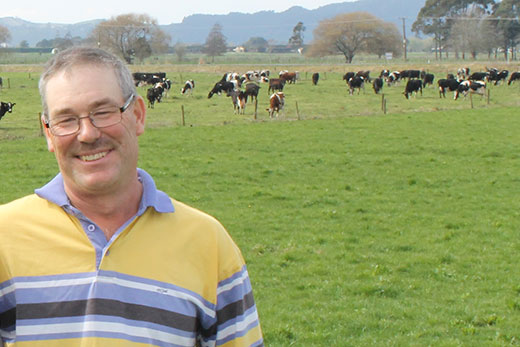Some consent conditions for dairy farm effluent can be negotiated with regional councils, but many farmers don’t realise that, says John Howard, Federated Farmers Bay of Plenty provincial vice president.
“The regional council consents officers and compliance officers are approachable. Dialogue is the best way to achieve the best results for all parties.”
However, farmers do have to take action to ensure their farming systems are not adversely impacting the environment and that they are meeting Fonterra supply conditions, says John.
“There are some who let themselves and the industry down and that’s not good enough. Unfortunately these are the ones that make all the headlines for all the wrong reasons and we are all judged by their performance.”
Capital investment
Fonterra’s high pay out for last season has enabled farmers to invest in capital projects and many of those have been effluent systems. “There are a lot of very expensive tanks and ponds going in all round the country.”
Farmers also need to get involved in the regional discussion on the National Policy Statement on Freshwater Management because decisions that are being made will affect their businesses.
“Farmer apathy really concerns me. I know everyone is busy and it takes an effort to stop work and attend meetings, but it is hard to demonstrate to local and regional councils that farmers want to be taken seriously, if they don’t turn up to meetings.
“Federated Farmers can’t do all the representation. Farmers have to take some responsibility to get involved themselves.”
On the other hand, local body councillors and staff need to walk in farmers’ boots to really understand what is happening on the land, John believes.
“One of the most useful days Federated Farmers has organised recently was taking councillors and some staff to visit the recent winners of the Ballance Farm Environment Awards to see what lengths dairy and dry stock farmers are going to, to protect the environment and yet remain sustainable farmers.”
Riparian plant
Council requirements for farmers to retire and plant riparian areas are not unreasonable and can enhance farmland but John says there is concern among farmers that the areas they have paid to retire, risk becoming classified by district councils as significant natural areas. Another issue concerning John is what he sees as mixed signals from Fonterra.
“On the one hand Fonterra is saying it doesn’t support farmers using induction at calving, but on the other is offering 52 cents off-peak incentive, which will often mean farmers could have used induction as a tool to calve cows early.
“New conditions, including those on detergent residues, have been brought in with little or no consultation with farmers. Then there’s the requirements around vat temperatures and minimum starting pick up volumes, all of which impact adversely on smaller farmers.
“I feel Fonterra is becoming more and more of a corporate, and not as in touch as it could be with farmers. That’s probably because we have fewer what I call “dirty hand” farmers, those who are actually working on farms, making decisions. I know this is hard because the business of Fonterra has become very complex and we need people who are corporate minded but they also need to be co-operative minded too.”
The increasing age of farmers, the rising cost of land and livestock are making it harder for young people to move up in the industry. John’s prediction is that within the next few decades many small family farms could be gone and the industry will be dominated by large corporate farms which will not necessarily be in the best interests of the industry.



0 Comments
Leave a Comment